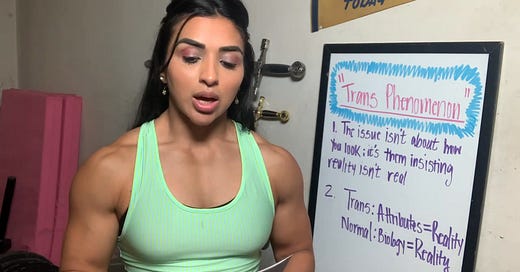I've built my life around building my body. The muscles I've sculpted through years of dedication have become both my calling card and, ironically, the subject of constant debate about my femininity.
In my recent video addressing what I call "the trans phenomena," I wanted to make something clear: there's a profound difference between being masculine and being a man. I can be a masculine woman with developed muscles, and that doesn't change my biological reality.
I was inspired to create this content after conversations with a friend who suggested the message might resonate differently coming from someone with my physique. As someone who receives regular comments that I'm "too muscular" or "too masculine," I understand the complexity of gender presentation firsthand.
Growing up I've navigated the boundaries between traditionally masculine and feminine interests. Now, as an adult in the fitness space, I've found myself unexpectedly positioned at the intersection of physical culture and gender politics.
The issue isn't about how you look, it's people insisting that reality isn't real. In my view, there's a troubling conflation happening in our culture between physical attributes and biological sex.
Just as women were once considered masculine merely for wearing pants or smoking cigarettes, having muscles is now often coded as a masculine trait. But these are just aesthetic judgments, not biological realities.
When I speak about transgender identity, i'm explicitly against transitioning, particularly for young people under 18 who are still discovering themselves. Even into your twenties, your identity is still forming. Making permanent biological changes during these formative years concerns me deeply.
I take pride in embracing my femininity despite having significant muscle mass. The way I carry myself matters just as much as, if not more than, my physical appearance. Some men appreciate my aesthetic; others don't. That's simply a matter of personal preference.
What's fascinating to me is how differently society responds to different expressions of gender nonconformity. A skinny tomboy who dresses like "a dude" typically receives fewer comments than a muscular woman. The reasons behind this disparity could fill another video entirely.
I recognize that by speaking on these issues, I'm venturing beyond typical fitness content, but I believe these conversations matter. Biology is real, and while attributes like muscle mass or clothing preferences may change, certain fundamental aspects of our identities are immutable.
My perspective has resonated with some viewers and provoked disagreement from others. I welcome this discourse. In an online world where workout routines and political positions increasingly intertwine, I believe in stating my position clearly, even when it might be controversial.
The muscles I've built don't define my womanhood—my biology does. This distinction is at the heart of everything I believe about gender identity. It's a perspective I'll continue to share alongside my fitness journey, inviting my audience to engage with ideas that extend well beyond sets and repetitions.














Share this post